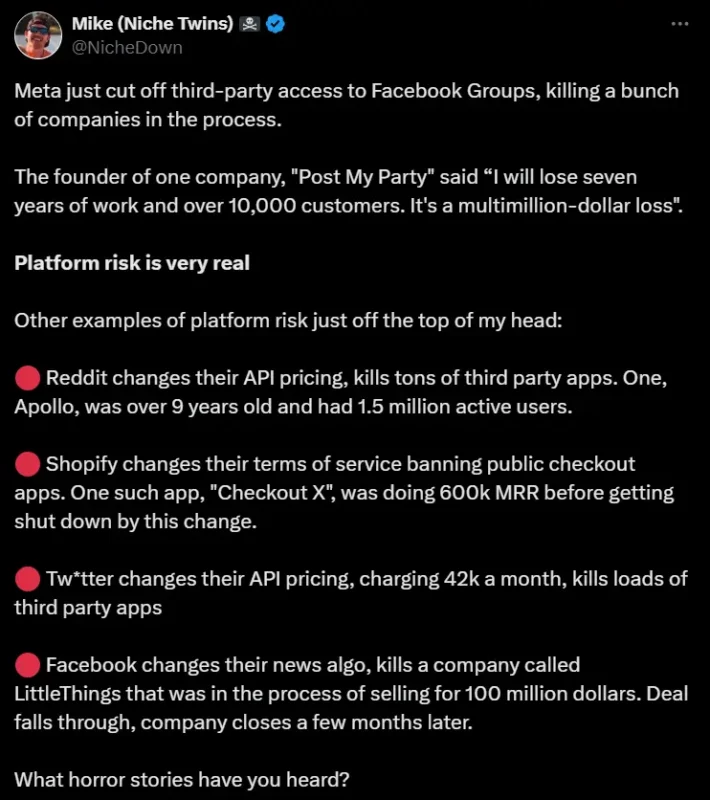Many digital businesses today rely heavily on a single platform for their operations. This trend is changing the way companies work in the digital age.
Depending on one platform can bring significant risks, impacting the sustainability and growth of a business. It’s important for any digital business to understand these risks if they want to succeed.
This blog post will discuss the risks of depending on a single platform and suggest ways to reduce these risks, helping your business stay competitive and flexible.
Exploring Single Source Platform Risks
When a business relies heavily on one digital platform, it can be vulnerable to any changes made by that platform. Imagine one day finding out that the API you use for customer data has new restrictions or costs that affect your business immediately.
Look at what happened in January 2024 when Meta suddenly limited third-party access to Facebook groups. Many businesses were caught off guard:

There have been numerous examples over the last few years, including changes by Reddit, Shopify, and Twitter, that have killed single-platform businesses.
Changes to API policies, terms of service, or privacy policies can severely impact a company’s operations and growth, showing the risks of depending on one platform.
To better manage these risks, consider these steps:
- Keep up-to-date with the platform’s terms and policies.
- Have backup plans that include other platforms or solutions.
- Connect with other businesses to exchange ideas and strategies about relying on platforms.
Key Takeaway: Relying on a single platform can expose your business to major operational risks. It’s crucial to be aware and prepared.
Impact on Business Continuity and Scalability
Relying too much on one digital platform can make it hard for your business to grow and adjust. If the platform you use goes down or changes its rules, your business might face delays.
Also, depending too much on one platform can limit your control over important business data and how you interact with customers. These are key for making your services personal and keeping customers happy.
Here are some steps to reduce these risks:
- Use a variety of platforms in your technology setup.
- Keep your business continuity plans up-to-date by reviewing and adjusting them regularly.
- Make sure you can communicate directly with your customers.
Key Takeaway: Relying too much on a single platform can limit your business growth and flexibility.
Strategies to Mitigate Single Source Platform Risks
Using multiple channels is key to avoid depending too much on one digital platform. This approach helps you spread your risk.
To handle reliance on one platform, it’s important to have your activities on various platforms. This increases your business’s stability and adaptability.
Here are some practical steps to protect your business:
- Expand your digital presence by using several platforms. For instance, if you only use Twitter/X, consider expanding to Meta platforms.
- Create your own customer database to keep in touch directly through emails and SMS. Newsletters that are well-tended can become profitable income sources.
- Invest in your own digital resources, like a strong website or mobile app. Consider scaling your business using enterprise SEO.
Key Takeaway: Expanding your digital strategy is crucial to lessen risks linked to depending on a single platform and to boost business stability.
Last Thoughts on Platform Dependency
We’ve discussed the risks of relying solely on one platform and ways to reduce these risks. It’s obvious that expanding your digital presence is not only beneficial but essential.
Evaluate your business’s current reliance on single platforms today. Begin taking proactive steps towards a broader digital strategy to ensure ongoing growth and stability. The future of your business may rely on this.
Related Video
If you’re ready to expand to multiple platforms, Single Grain’s marketing experts can help!👇
For more insights and lessons about marketing, check out our Marketing School podcast on YouTube.



